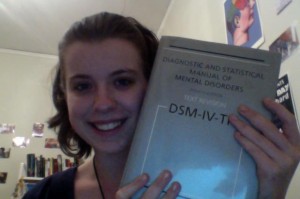Tonight at 6:00pm Central (that is, right now), I’m giving a talk about skepticism and the DSM: the Diagnostic and Statistical Manual of Mental Disorders.
Summary:
Multiple personalities? Personality disorders? The Diagnostic and Statistical Manual (DSM) contains a list of all recognized mental illnesses. How valid is it? Kate will look at the best and worst mental health diagnoses and talk about what makes for useful skepticism when it comes to mental health.
My goals:
-How the DSM gets the diagnoses
-Should we throw it out?
-What diagnoses are particularly good? Which ones are particularly bad? Why?
–Overdiagnoses. Let’s talk about it.
-What does the future of diagnosing mental illness look like? (In which Kate makes wild speculation and expects to be wrong.)
-Taking lots of questions.
—- A Long List of Resources and Elaboration on Things I Mention —-
Reliabilty vs. Validity. I touched on the difference, but there’s also different kinds of each! Learn more here.
Changes to the DSM? Take a look at the whole list via the DSM5 website.
I talked about the 1973 change that removed homosexuality from its classification as a mental disorder. For more information here’s a transcript of an interview with some of the psychiatrists in the American Psychiatric Association (APA) who made it happen. Includes Nixon masks and a secret group called the GayPA.
Part 1
Part 2
Schizophrenia: more info on symptoms and causes here.
Eating disorders–a comprehensive collection of research.
DSM5 updates [pdf]
Depression
–Prevalence
–Biomarkers research
Personality disorders: the DSM5 alternate hybrid model [pdf]
Obligatory Marsha Linehan fangirling
[Will update with more post-talk!]
IMPORTANT: I won’t be able to check comments here! Ask your questions in the chatroom, etc.


Supplying us with factual information is so very important. I really need to have this information available and am very happy that I now have a source to go to.
Thank you – I really enjoyed that! As a Canadian, I found your comments about insurance really saddening – it’s not a real issue here, because of our universal health care system. I have actually heard more than one psychiatrist (in reference to different patients) say something to the effect that the label doesn’t matter all that much – what’s more important is the manner of treatment. For example, a person who gets depressed but becomes manic on SSRIs can try the medications that work for bipolar depression, even if s/he doesn’t fit the diagnostic criteria for one of the Bipolar disorders. What do you think about that approach?
As a person working on earning an MA-P and hoping for a Doctorate eventually, I really appreciate skeptical discussions on Psychology. To many of my peers and even professionals are so credulous that it’s hard to separate the figurative wheat from the chaff.